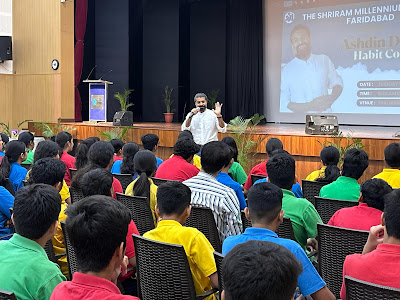The Power of a Child’s Questions: Why You Should Value Your Child’s Curiosity?
There comes a time in every parent’s life when your child, while staring at a leaf or drawing a leaf, asks a question that renders you momentarily unable to move.
“Why can’t I make the sky green?”
“Where do the numbers go when I delete them?”
“Who decides what’s right?”
You stop, torn between answering the question and the pleasure of the realization – they are thinking, not just learning.
It’s in these moments, often informal and unscripted, that actual learning takes root. From curiosity cracking open the world around them, not from worksheets or perfectly balanced timetables.
We, as parents, have been conditioned to obsess about outcomes. Marks. Medals. Milestones. But what if the true signs of a great education have nothing to do with knowledge, at least not in the conventional sense, and not in what our children know, but in how they know what they know, how they stretch into the unknown, what questions they ask?
The Transition from “What” to “Why”
For years, schools have been thought of as knowledge dispensaries – locations that fill heads with information. But for today there is a little more to it than that. It requires agility, empathy and imagination.
In that universe, a child’s marvel becomes their superpower. And education? It’s not so much about the what as it is about the why. Why is this the way of the world? Why does it feel different to people? Why can’t things change?
These questions aren’t distractions from education; they’re education.
The Invisible Curriculum
What does a child actually learn from a classroom where questions are invited?
They discover their voice counts.
They discover that knowledge is not fixed.
They come to understand that exploratory work is legitimate even if it turns out to be a dead end.
It’s the stuff some people call the “invisible curriculum” – the values, the grit, the posture that no syllabus ever lists but every great school imparts.
And it begins with trust. Have faith in children’s capacity for deep thought. Trust educators who are holding space for those conversations not being held at home, and trust in ourselves, as parents, to not always rush in with answers.
The Future of the Classroom is Already Here
Let’s be honest. It is an unpredictable world our kids will inherit. Technology is re-engineering jobs, and emotional intelligence is surging up the list of what employers (and humans) value. Therefore, as we go looking for the best CBSE affiliated schools in Faridabad, or hunt for that one perfect CBSE school in Faridabad which can assure us of academic physical enhancement – let’s also get the below petty:What approach or psychology of teaching does the school follow?
Is this a safe environment where my child can ask questions?
Will they be praised for trying something different – even if it doesn’t work?
Will they learn to listen, not just to speak?
Because the future doesn’t require perfect levels of achievement; it requires people who are able to think, feel and question things.
The Role We Play as Parents
We frequently think that our job is done when we have selected the school. But really, that’s only the start. Our houses are the earliest laboratories of inquiring.
So, the next time your son or daughter comes out with a completely new or ridiculous or crazy question – stop a moment. Rather than responding, ask them back:
“What do you think?”
You’ll be amazed. Not that their answer is correct but that it exists. You will start to see the shapes of a mind trained not to copy and repeat, but to innovate and create.
The New Definition of Success
We need new definitions of success, not based on the flawed legacy of the one we have now, but based on our own values, goals and measures of progress.
Not by trophies, but by grit.
Not by being correct, but by being curious.
Let’s raise children who can do what is challenging, who can say what is difficult, who can wonder out loud and have answers that lead to action. Let’s lift up the schools that reflect these values, not just on glossy brochures, but in day-to-day learning.
The Final Words: Because it’s the Questions that are Going to Build their Future
Kids will forget dates. They’ll forget formulas. But they’ll remember how a teacher made them feel listened to.
They will remember how their question once led to an experiment. Or a play. Or a giggle exchanged with a classmate.
And that memory will be a muscle – the muscle to keep asking, keep trying and keep growing.
In this effort to raise thinkers, creators and empathizers, some schools are quietly in the lead, creating the conditions that matter. The Shriram Millennium School, is one such CBSE school in Faridabad in question. Centered on inquiry-driven learning, empathetic leadership and preparing your child for the real world, it goes beyond what’s presumed and nurtures children who don’t just learn – they wonder. And in a world, hungry for imagination and depth, that makes all the difference.



Comments
Post a Comment